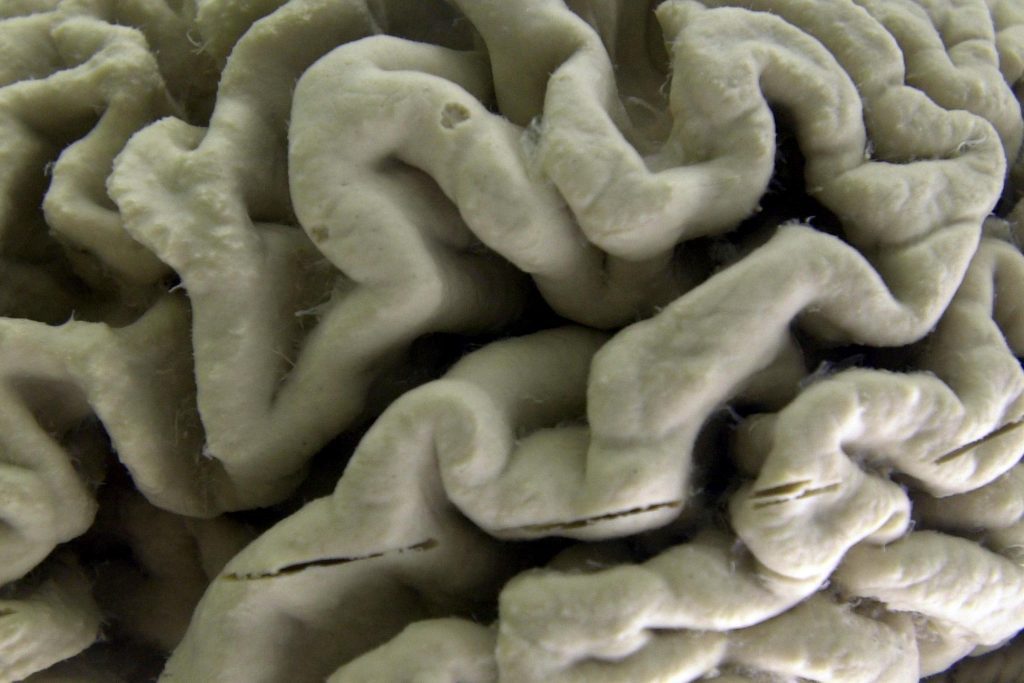By LAURAN NEERGAARD (AP Medical Writer)
For the first time, scientists have identified a genetic form of late-in-life Alzheimer’s disease, which occurs in people who inherit two copies of a concerning gene.
Researchers have known for a long time that a gene called APOE4 can increase the risk of Alzheimer’s, especially as people age. However, a new study indicates that for those with two copies of the gene, it is not just a risk factor but an underlying cause of the disease.
Dr. Juan Fortea, who led the study at the Sant Pau Research Institute in Barcelona, Spain, describes the findings as having significant implications.
For those with two copies of APOE4, symptoms may start seven to 10 years earlier than in other older adults who develop Alzheimer’s.
Around 15% of Alzheimer’s patients carry two copies of APOE4, meaning these cases can be attributed to a genetic cause. Previously, genetic forms of Alzheimer’s were thought to only affect those at much younger ages. younger ages and account for less than 1% of all cases.
The research highlights the need to develop treatments that target the APOE4 gene. Some doctors are cautious about prescribing the only drug, Leqembi, which has been found to slightly slow the disease, to people with the gene pair due to their increased risk of a dangerous side effect, explains Dr. Reisa Sperling, a study coauthor at Harvard-affiliated Brigham and Women’s Hospital in Boston. hunts ways to prevent There is a need to find ways to prevent or delay Alzheimer’s, especially in this significant group, who are at risk before showing symptoms, Sperling says.
Sperling However, this discovery does not mean that people should rush to get a gene test. Sperling emphasizes the importance of not alarming everyone with a family history of Alzheimer’s, as this gene pair is not the cause of most cases. However, this discovery does not mean that people should rush to get a gene test. Sperling emphasizes the importance of not alarming everyone with a family history of Alzheimer’s, as this gene pair is not the cause of most cases.
HOW DO GENETICS AFFECT ALZHEIMER’S?
More than 6 million Americans, and millions more worldwide, have Alzheimer’s. A handful of genes are known to cause rare “early-onset” forms, mutations passed through families that trigger symptoms unusually young, by age 50. Some cases also are linked to Down syndrome.
But Alzheimer’s most commonly strikes after 65, especially in the late 70s to 80s, and the APOE gene – which also affects how the body handles fats — was long known to play some role. There are three main varieties. Most people carry the APOE3 variant that appears to neither increase nor decrease Alzheimer’s risk. Some carry APOE2, which provides some protection against Alzheimer’s.
APOE4 has long been labeled the biggest genetic risk factor for late-in-life Alzheimer’s, with two copies risker than one. About 2% of the global population is estimated to have inherited a copy from each parent.
RESEARCH POINTS TO A CAUSE FOR A SUBSET OF ALZHEIMER’S
To better understand the gene’s role, Fortea’s team used data from 3,297 brains donated for research and from over 10,000 people in U.S. and European Alzheimer’s studies. They examined symptoms and early hallmarks of Alzheimer’s such as sticky amyloid in the brain.
According to a report in the journal Nature Medicine, individuals with two APOE4 copies were found to accumulate more amyloid by age 55 compared to those with just one copy or the APOE3 gene. By age 65, nearly three-quarters of the double carriers showed significant plaque buildup in brain scans, and they were more likely to experience initial symptoms of Alzheimer's around that age rather than in their 70s or 80s.
Fortea stated that the underlying biology of the disease was strikingly similar to inherited types that affect young individuals.
Dr. Eliezer Masliah of the National Institute on Aging described it as resembling a familial form of Alzheimer's, emphasizing that it's not solely a risk factor.
Sperling cautioned that not everyone with two APOE4 genes develops Alzheimer’s symptoms and emphasized the importance of understanding why.
She clarified that having two APOE4 genes doesn't necessarily guarantee developing the disease.
POTENTIAL IMPACT OF THE NEW FINDINGS ON ALZHEIMER’S RESEARCH AND TREATMENT
While the drug Leqembi removes some sticky amyloid, Sperling noted uncertainty about its effectiveness for carriers of two APOE4 genes, due to their high risk of dangerous side effects such as brain swelling and bleeding. It's being explored whether starting such drugs earlier would yield better results for them.
Masliah highlighted ongoing research focused on developing gene therapy or drugs specifically targeting APOE4. He stressed the need to comprehend the effects of APOE4 in diverse populations, as current studies primarily involve white individuals of European descent.
Currently, gene tests are mainly used to assess potential candidacy for Leqembi or for individuals participating in Alzheimer’s research, particularly studies investigating possible prevention methods. Sperling noted that individuals most likely to carry two APOE4 genes have parents who both developed Alzheimer’s relatively early – in their 60s rather than 80s.
The Associated Press Health and Science Department is supported by the Howard Hughes Medical Institute’s Science and Educational Media Group, and is solely responsible for all content.
___
For the first time, researchers have identified a genetic variation of late-onset Alzheimer’s disease. While most cases occur after age 65, a gene called APOE4 has long been considered a major risk factor. However, new research suggests that inheriting two copies of this gene doesn't just pose a risk – it appears to be the root cause. Around 15% of Alzheimer’s patients are believed to carry this gene pair. Scientists believe this distinction could have significant implications for both research and treatment. The findings were published in Nature Medicine on Monday.









